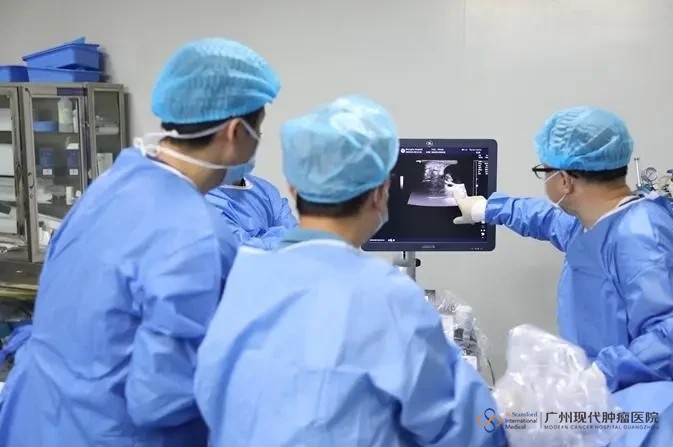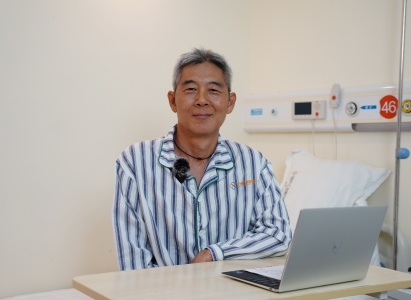 Views:134
Views:134 2025-01-08
2025-01-08 Share
Share
Applicable diseases:
Lung cancer, prostate cancer, breast cancer, liver cancer, nasopharyngeal cancer, tongue cancer, carcinoma of parotid gland, carcinoma of tonsil, cervical cancer, endometrial cancer, etc.Technology advantages:
High precision, remarkable therapeutic effect; high safety, no damage to normal tissues; small trauma, good continuity; repeatability, wide range of indicationsWhat is 125I seed Implants (particle knife)?
Particle implantation therapy, commonly known as "particle knife", is a minimally invasive treatment method newly invented by the international medical community in response to the inadequacy of surgery and external radiotherapy.
Firstly, according to the nature, size and location of the patient's tumor, the treatment calculates the appropriate ray energy and selects the appropriate particle dose; then under the guidance of imaging equipment, the 125 iodine particles are implanted into the tumor or the tissues infiltrated and invaded by the tumor, so that the γ-rays released by the 125I particles to the tumor can directly and accurately kill the cancer cells, and play the role of internal radiation therapy on the tumor to achieve the same effect of resection by the scalpel. It can achieve the same effect as scalpel excision.

Particle implantation treatment steps
1. Determine the number of particles and the location of particle implantation.
2. After local anesthesia, locate the tumor under the guidance of imaging equipment.
3. Precisely insert the particle implantation needle into the tumor and implant the particles.
4. The particles continuously emit gamma rays inside the tumor, causing the DNA chain of the cancer cells to break, losing their ability to reproduce and causing the tumor to necrose and shrink.
Applicable group:
Individuals for whom particle implantation therapy is indicated:
1. patients with untreated primary tumors
2. patients who refuse or are not suitable for surgery
3. patients with poor or failed external irradiation radiation therapy
4. patients with insufficient dose of external irradiation and need local dose supplementation
5. patients with residual tumor or tumor too close to the incision margin (<0.5cm) during surgery
6. patients with postoperative recurrence of cancer who cannot tolerate surgery again
7. patients with metastatic tumor lesions or postoperative isolated tumor metastases that have lost the value of surgery
8. Patients who want to prevent local or regional spread of tumor and enhance the sexual effect.
Applicable diseases for particle implantation therapy:
Lung Cancer, Prostate Cancer, Breast Cancer, Liver Cancer, Nasopharyngeal Cancer, Tongue Cancer, Parotid Cancer, Tonsil Cancer, Cervical Cancer, Endometrial Cancer, etc.
Innovative Particle Implantation Therapy vs. Conventional Radiotherapy
1.Safety
*Particle Implantation Therapy: High safety
*Conventional Radiotherapy: High risk
2.Damage
*Particle Implantation Therapy: Small incision of millimeters; particle effect occurs only inside the implanted tumor, reducing the amount of irradiation to normal tissues, fewer side effects, fewer complications
*Conventional Radiotherapy: While irradiating the tumor tissue, radiation will also bring damage to the surrounding normal tissues, leading to decreased immune function and serious toxic side effects, such as nausea, vomiting, diarrhea, and loss of appetite.
3. Irradiation dosage
*Particle Implantation Therapy: The irradiation range of 125I particles is small, the continuous radiation is only locally aimed at the tumor, the targeting is strong, and the irradiation dose to the tumor is high, which can be up to 2-3 times that of external radiotherapy.
*Conventional Radiotherapy: Conventional external radiation radiotherapy has a large irradiation range, with high energy rays irradiating the tumor from outside the body through the skin and normal tissues, and the dose reaching the tumor is small.
4. Treatment period
*Particle Implantation Therapy: A single session of 125I particle implantation with a continuous effective irradiation time of 6 months, which reduces the number of times patients have to go to the hospital for treatment
*Conventional Radiotherapy: External radiation radiotherapy is usually given 5 times a week, and a course of treatment usually lasts 1-2 months.
5. Efficacy
*Particle Implantation Therapy: Continuous low-dose irradiation of cancer cells for up to 6 months, resulting in uniform irradiation of cancer cells, effective for cancer cells in different developmental cycles
*Conventional Radiotherapy: External radiation therapy with fractionated, short-duration irradiation can only treat a portion of the cancer cells in the tumor reproduction cycle.
Advantages of particle implantation therapy:
1. High precision
Through the precise design of the particle implantation planning system, the location, quantity and implantation path of the implanted particles are accurately designed.
2. Remarkable therapeutic effect
The radiation source concentrates on the tumor, targeting and killing the tumor with high efficiency and good effect.
3. Good continuity
With continuous radiation, the irradiation period is up to 180 days, which makes the cancer cells get uniform irradiation and is effective for cancer cells in different development cycles.
4. No damage to normal tissues
The therapeutic distance of rays in the body is short, between 5mm and 50mm, realizing radiation therapy with less irradiation dose to normal tissues, less damage and fewer side effects.
5. High safety
Only local low-dose irradiation of tumor foci, the effective range of radiation damage to medical personnel and patients' families is far lower than the national protection standard.
6. Smaller incision
Implanted by percutaneous puncture, no need for incision, millimeter incision.
7. High tissue compatibility
The 125 iodine particles are packed in titanium alloy shells, which have good tissue compatibility with the human body, will not produce rejection, and will not produce radiation leakage and contamination.
8. Good compatibility
Particle implantation therapy does not affect other treatments, if with other treatments, can make its therapeutic effect better.
9. Repeatable
Particle implantation can be operated many times, if the patient does not have enough particle implantation, it can be replenished directly.
10. Wide range of indications
Particle implantation therapy is applicable to the vast majority of solid tumors.
Precautions
The effective range of 125I particle radiation is 1.7CM, the radiation damage to doctors and patients is far lower than the national protection standard, so there is no need to worry about radiation safety.
Patients should try to avoid close contact with pregnant women or children under 3 years old within 2 months after implantation treatment, and after 2 months, the radiation will gradually diminish and normal life will be resumed.
The shell of radioactive particles is made of titanium alloy, which is not affected by magnetic field, so after implantation of radioactive particles in the human body, CT, MRI, X-ray, ultrasound and other examinations can be done as usual.
 Prostate cancer
Prostate cancer- Mr.Chen
- Malaysiamore than 1 year
Mr.Chen was diagnosed prostate cancer, the local doctor suggested him to undergo a direct resection, but Mr.TING wanted to live a life like normal peop...


 (MY)+60 10-898 8919
(MY)+60 10-898 8919

























